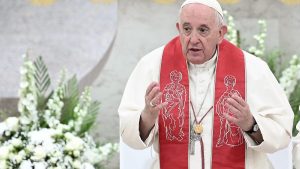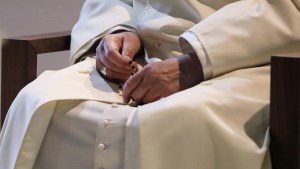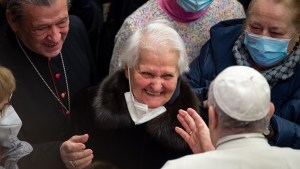Pope Francis’ fourth encyclical, released this October 24, is first off a Biblical and philosophical look at the concept of the “heart” and then an invitation to go deeper in and take up again devotion to the Sacred Heart of Jesus.
While the text brings into play a wide variety of inspirations — literature from Homer to Dostoevsky, saints and popes, and modern themes from artificial intelligence to phone use — it has the moments of simplicity so characteristic of Pope Francis.
Among these are references to his grandmother’s kitchen.
Speaking about how the heart is the place of ultimate sincerity, he offered an image:
As an illustration of this, I would repeat a story I have already told on another occasion. “For the carnival, when we were children, my grandmother would make a pastry using a very thin batter. When she dropped the strips of batter into the oil, they would expand, but then, when we bit into them, they were empty inside. In the dialect we spoke, those cookies were called ‘lies’… My grandmother explained why: ‘Like lies, they look big, but are empty inside; they are false, unreal.’”
With all the warmth that a grandmother’s kitchen brings to mind he speaks of how “in this age of artificial intelligence, we cannot forget that poetry and love are necessary to save our humanity.”
“No algorithm will ever be able to capture, for example, the nostalgia that all of us feel, whatever our age, and wherever we live, when we recall how we first used a fork to seal the edges of the pies that we helped our mothers or grandmothers to make at home.”
Here he references the typical Argentinean empanadas, but the same method is used for dessert pies and so the image translates easily.
The Pope continues:
It was a moment of culinary apprenticeship, somewhere between child-play and adulthood, when we first felt responsible for working and helping one another. Along with the fork, I could also mention thousands of other little things that are a precious part of everyone’s life: a smile we elicited by telling a joke, a picture we sketched in the light of a window, the first game of soccer we played with a rag ball, the worms we collected in a shoebox, a flower we pressed in the pages of a book, our concern for a fledgling bird fallen from its nest, a wish we made in plucking a daisy. All these little things, ordinary in themselves yet extraordinary for us, can never be captured by algorithms. The fork, the joke, the window, the ball, the shoebox, the book, the bird, the flower: all of these live on as precious memories “kept” deep in our heart.
While the memories are simple, the Pope is speaking about a philosophical concept, the innermost core of the human person:
This profound core, present in every man and woman, is not that of the soul, but of the entire person in his or her unique psychosomatic identity. Everything finds its unity in the heart, which can be the dwelling-place of love in all its spiritual, psychic and even physical dimensions.
In a word, if love reigns in our heart, we become, in a complete and luminous way, the persons we are meant to be, for every human being is created above all else for love. In the deepest fibre of our being, we were made to love and to be loved.
When elderly women weep
Pope Francis has often spoken of his grandmothers, and the importance of the elderly for a society and culture is one of his most often-repeated themes.
The beauty and security of his grandmother’s kitchen is contrasted in the encyclical with another reference to grandmothers, this time to those who are suffering from war:
We need only to see and listen to the elderly women – from both sides – who are at the mercy of these devastating conflicts. It is heart-breaking to see them mourning for their murdered grandchildren, or longing to die themselves after losing the homes where they spent their entire lives. Those women, who were often pillars of strength and resilience amid life’s difficulties and hardships, now, at the end of their days, are experiencing, in place of a well-earned rest, only anguish, fear and outrage. Casting the blame on others does not resolve these shameful and tragic situations. To see these elderly women weep, and not feel that this is something intolerable, is a sign of a world that has grown heartless.
The poet’s realm
In a few different places in the encyclical, Pope Francis speaks of poetry as the language linked to the heart.
“In this age of artificial intelligence, we cannot forget that poetry and love are necessary to save our humanity,” he says.
And:
If we devalue the heart, we also devalue what it means to speak from the heart, to act with the heart, to cultivate and heal the heart. If we fail to appreciate the specificity of the heart, we miss the messages that the mind alone cannot communicate; we miss out on the richness of our encounters with others; we miss out on poetry.





